Related Research Articles
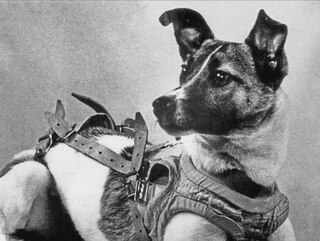
Laika was a Soviet space dog who was one of the first animals in space and the first to orbit the Earth. A stray mongrel from the streets of Moscow, she flew aboard the Sputnik 2 spacecraft, launched into low orbit on 3 November 1957. As the technology to re-enter the atmosphere had not yet been developed, Laika's survival was never expected. She died of hyperthermia hours into the flight, on the craft's fourth orbit.
Pepper(s) may refer to:

Guide dogs are assistance dogs trained to lead blind or visually impaired people around obstacles. Although dogs can be trained to navigate various obstacles, they are red–green colour blind and incapable of interpreting street signs. The human does the directing, based on skills acquired through previous mobility training. The handler might be likened to an aircraft's navigator, who must know how to get from one place to another, and the dog is the pilot, who gets them there safely. In several countries guide dogs, along with most other service and hearing dogs, are exempt from regulations against the presence of animals in places such as restaurants and public transportation.
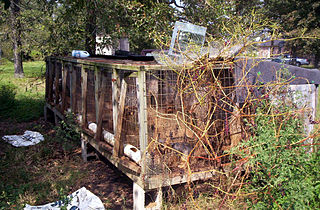
A puppy mill, also known as a puppy farm, is a commercial dog breeding facility characterized by quick breeding and poor conditions. Although no standardized legal definition for "puppy mill" exists, a definition was established in Avenson v. Zegart in 1984 as "a dog breeding operation in which the health of the dogs is disregarded to maintain a low overhead and maximize profits". They are cited as being a result of increased demand for household pets, especially after World War II. The Veterinary Medical Association of the Humane Society of the United States defines the main characteristics of a puppy mill as "emphasis on quantity over quality, indiscriminate breeding, continuous confinement, lack of human contact and environmental enrichment, poor husbandry, and minimal to no veterinary care."

Bull-baiting is a blood sport involving pitting a bull against dogs with the aim of attacking and subduing the bull by biting and holding onto its nose or neck, which often resulted in the death of the bull.
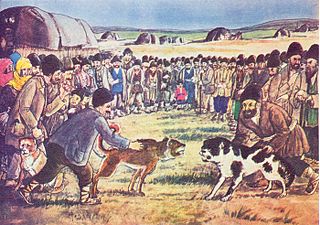
Dog fighting is a type of blood sport that turns game and fighting dogs against each other in a physical fight, often to the death, for the purposes of gambling or entertainment to the spectators. In rural areas, fights are often staged in barns or outdoor pits; in urban areas, fights are often staged in garages, basements, warehouses, alleyways, abandoned buildings, neighborhood playgrounds, or in the streets. Dog fights usually last until one dog is declared a winner, which occurs when one dog fails to scratch, dies, or jumps out of the pit. Sometimes dog fights end without declaring a winner; for instance, the dog's owner may call the fight.

Ingrid Elizabeth Newkirk is a British-American animal activist, author and the president of People for the Ethical Treatment of Animals (PETA), the world's largest animal rights organization.

The Animal Welfare Act was signed into law by President Lyndon B. Johnson on August 24, 1966. It is the main federal law in the United States that regulates the treatment of animals in research and exhibition. Other laws, policies, and guidelines may include additional species coverage or specifications for animal care and use, but all refer to the Animal Welfare Act as the minimally acceptable standard for animal treatment and care. The USDA and APHIS oversee the AWA and the House and Senate Agriculture Committees have primary legislative jurisdiction over the Act. Animals covered under this Act include any live or dead cat, dog, hamster, rabbit, nonhuman primate, guinea pig, and any other warm-blooded animal determined by the Secretary of Agriculture for research, pet use or exhibition. Excluded from the Act are birds, rats of the genus Rattus, mice of the genus Mus, farm animals, and all cold-blooded animals.

The Treeing Walker Coonhound is a breed of hound descended from the English and American Foxhounds. The breed originated in the United States when a stolen dog known as "Tennessee Lead" was crossed into the Walker Hound in the 19th century. The Treeing Walker Coonhound was recognized officially as a breed by the United Kennel Club in 1945 and by the American Kennel Club in 2012.
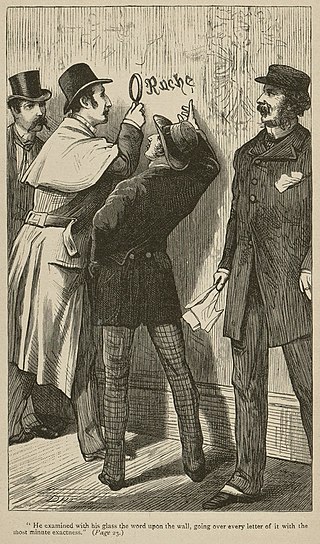
A red herring is something that misleads or distracts from a relevant or important question. It may be either a logical fallacy or a literary device that leads readers or audiences toward a false conclusion. A red herring may be used intentionally, as in mystery fiction or as part of rhetorical strategies, or may be used in argumentation inadvertently.

Dog meat, also known as fragrant meat or simply fragrant, is the meat derived from dogs. Historically human consumption of dog meat has been recorded in many parts of the world.

A dog bite is a bite upon a person or other animal by a dog. More than one successive bite is often called a dog attack, although dog attacks can include knock-downs and scratches. Though some dog bites do not result in injury, they can result in infection, disfigurement, temporary or permanent disability, or death. Another type of dog bite is the "soft bite" displayed by well-trained dogs, by puppies, and in non-aggressive play. Dog bites can occur during dog fighting, as a response to mistreatment, by trained dogs working as guard, police or military animals, or during a random encounter.
Dog theft is the crime of taking a dog from its owner. The theft of a dog to be held for ransom may be called dognapping, by analogy with kidnapping.

Dog fighting in the United States is an activity in which fights between two game dogs are staged as a form of entertainment and gambling. Such activity has existed since the early 19th century in the United States and was gradually prohibited in all states. It continues as an underground activity in both rural and urban locations.
Animals used by laboratories for testing purposes are largely supplied by dealers who specialize in selling them to universities, medical and veterinary schools, and companies that provide contract animal-testing services. It is comparatively rare that animals are procured from sources other than specialized dealers, as this poses the threat of introducing disease into a colony and confounding any data collected. However, suppliers of laboratory animals may include breeders who supply purpose-bred animals, businesses that trade in wild animals, and dealers who supply animals sourced from pounds, auctions, and newspaper ads. Animal shelters may also supply the laboratories directly. Some animal dealers, termed Class B dealers, have been reported to engage in kidnapping pets from residences or illegally trapping strays, a practice dubbed as bunching.

A free-ranging dog is a dog that is not confined to a yard or house. Free-ranging dogs include street dogs, village dogs, stray dogs, feral dogs, etc., and may be owned or unowned. The global dog population is estimated to be 900 million, of which around 20% are regarded as owned pets and therefore restrained.
Dogs in the United States have significant popularity and status – they are often treated as family members. Currently, the American Kennel Club is the largest registry of pure breed dogs across the world.
A Dog's Best Friend is a 1959 American Drama Western film directed by Edward L. Cahn and written by Orville H. Hampton. The film stars Bill Williams, Marcia Henderson, Roger Mobley, Roy Engel, Charles Cooper and Harry Dean Stanton. The film was released on December 20, 1959, by United Artists.
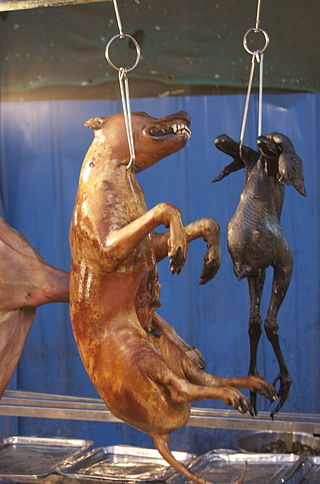
The Dog Meat Festival, also known as the Yulin Dog Meat Festival or Lychee and Dog Meat Festival, is an annual festival held in Yulin, Guangxi, China, during the summer solstice from 21 June to 30 June in which festival observers consume dog meat accompanied by lychees or other plants.

Wayne Hsiung is an American activist and attorney. Hsiung is a co-founder of The Simple Heart Initiative and previously led the animal rights group Direct Action Everywhere (DxE), which he also co-founded. During his time as a lawyer, he worked with the law firms DLA Piper and Steptoe & Johnson, was a Searle Fellow and visiting assistant professor at the Northwestern University School of Law, and a National Science Foundation-funded graduate student at the Massachusetts Institute of Technology. Hsiung ran for mayor of Berkeley, California, in 2020, largely focused on the issue of animal rights, and earned 24% of the vote, defeated by incumbent Jesse Arreguin.
References
- ↑ Herzog, Hal (9 August 2011). Some we love, Some we hate, Some we eat - Why it's so hard to think straight about animals. Harper Perennial. pp. 223–224. ISBN 978-0-06-173085-6.